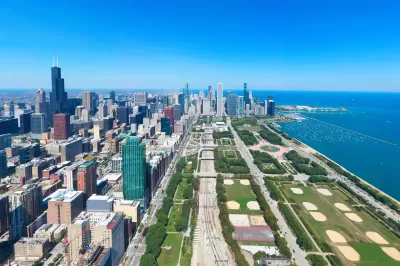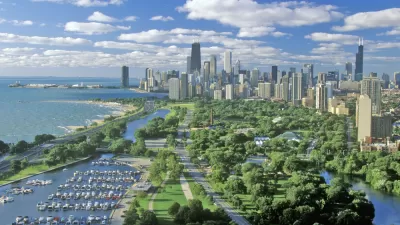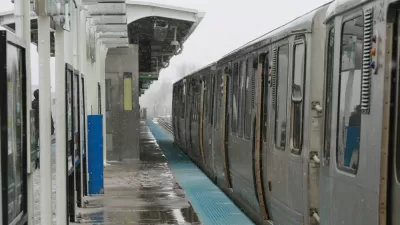Subsurface heat islands in dense urban areas can cause buildings and infrastructure to shift, tilt, and crack, a new study finds.

A novel study by Northwestern University in Chicago says there is a “silent hazard beneath the streets” that could have a major impact on buildings and infrastructure in the future: “underground climate change.” A Financial Times article by Patti Waldmeir details the findings and what it could mean for Chicago and other cities around the world.
The Northwestern research team, headed up by researcher Alessandro Rotta Loria, were the first to study how these subsurface heat islands that deform the ground affect urban infrastructure, Waldmeir reports. They placed underground sensors throughout the Chicago Loop and found the ground beneath some buildings can be 18F hotter than underneath a large park along the lake nearby. The effect is caused by heat emitted into the ground by underground structures (garages, basements, El tunnels, etc.) which causes the ground to expand and contract.
While these subsurface heat items aren’t likely to cause buildings to collapse or kill anyone, in the long-term, Rotta Loria said, it could mean shifting, tilting, and cracking buildings and infrastructure, which lead to significantly higher repair and maintenance costs, particularly in cities built near water.
FULL STORY: Sinking skyscrapers, new beaches: Chicago faces the climate crisis

Alabama: Trump Terminates Settlements for Black Communities Harmed By Raw Sewage
Trump deemed the landmark civil rights agreement “illegal DEI and environmental justice policy.”

Planetizen Federal Action Tracker
A weekly monitor of how Trump’s orders and actions are impacting planners and planning in America.

The 120 Year Old Tiny Home Villages That Sheltered San Francisco’s Earthquake Refugees
More than a century ago, San Francisco mobilized to house thousands of residents displaced by the 1906 earthquake. Could their strategy offer a model for the present?

LA’s Tree Emergency Goes Beyond Vandalism
After a vandal destroyed dozens of downtown LA trees, Mayor Karen Bass vowed to replace them. Days later, she slashed the city’s tree budget.

Sacramento Leads Nation With Bus-Mounted Bike Lane Enforcement Cameras
The city is the first to use its bus-mounted traffic enforcement system to cite drivers who park or drive in bike lanes.

Seattle Voters Approve Social Housing Referendum
Voters approved a corporate tax to fund the city’s housing authority despite an opposition campaign funded by Amazon and Microsoft.
Urban Design for Planners 1: Software Tools
This six-course series explores essential urban design concepts using open source software and equips planners with the tools they need to participate fully in the urban design process.
Planning for Universal Design
Learn the tools for implementing Universal Design in planning regulations.
Ada County Highway District
Clanton & Associates, Inc.
Jessamine County Fiscal Court
Institute for Housing and Urban Development Studies (IHS)
City of Grandview
Harvard GSD Executive Education
Toledo-Lucas County Plan Commissions
Salt Lake City
NYU Wagner Graduate School of Public Service





























